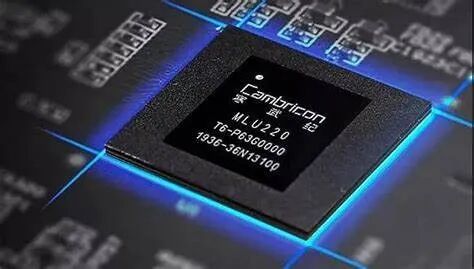“Without chips from Nvidia and other foreign companies, China’s artificial intelligence industry will directly lose its foundation.” A foreign media outlet once asserted.
This incredibly arrogant conclusion has finally met its moment of reckoning. On April 18, according to the “Securities Times,” domestic AI chip design company Cambricon released a report. The report shows that in just the first quarter of this year, Cambricon achieved total revenue of 1.111 billion yuan, almost equivalent to the total revenue for the entire year of 2024, with a year-on-year growth rate of 4230.22%!
Industry analysts believe that the growth in Cambricon’s performance indicates that domestic artificial intelligence chips have risen. However, it is quite intriguing that at the same time Cambricon released this report, chip giant Nvidia, facing a decline in performance in China, had its leader Jensen Huang hurriedly visit China to seek connections.

To show seriousness, Huang even gave up his signature black leather jacket and rarely wore a suit. Foreign media commented that they never expected the Chinese chip market would make him so nervous.
1. Are Domestic Chips Taking Off?
Perhaps from the data perspective, in front of Nvidia, which has a market value in the trillions of dollars, the small achievements of domestic chip company Cambricon seem insignificant.But what matters is not how much revenue has been achieved, but the trend and reasons for revenue growth.
Looking closely at Cambricon’s report, it is not difficult to find many highlights.
Cambricon stated in its announcement that the rapid growth in the first quarter was mainly due to the company’s market expansion and technological application advancement in the artificial intelligence field. In other words, the significant growth supporting Cambricon is not some trivial business, but precisely the currently hottest AI chips.

Industry insiders believe that the breakthrough of domestic chips in core technology is the real reason for Nvidia’s anxiety. In fact, in recent years, with the advancement of science and technology in our country, many “core technologies” that were once proudly controlled by Europe and the United States are facing the same crisis.
For example, in the field of biomedicine, European and American companies once firmly controlled the production technology of anti-aging results, profiting through monopolistic means, with some anti-aging factors sold for as much as 20,000 yuan per gram. However, with the technological breakthroughs of domestic “probiotics,” the advantages of Europe and the United States are no longer, and many once-glorious companies are facing their darkest moments.
Currently, the situation is not optimistic for Nvidia either; the rise of domestic chips is imminent, and they are also being hampered by the foolish tariff policies of the United States.
Another highlight in Cambricon’s financial report is that to cope with a series of external instability factors such as U.S. tariffs, Cambricon seems to have been well-prepared, with first-quarter inventory reaching 2.755 billion yuan, a 50% increase from the end of last year, while prepayments to upstream suppliers increased to 973 million yuan.
This means that even if targeted by the U.S. in the near future, Cambricon’s strong reserve capacity is sufficient to support it through the winter.According to Tianfeng Securities, Cambricon is expected to have a higher revenue volume in the upcoming second quarter.
2. In the Trend of Domestic Alternatives, Nvidia is Anxious
The rise of domestic chip companies is naturally something Nvidia does not want to see.
Although this company is still in a leading position in the industry, the keen Huang has clearly sensed a hint of crisis, so even in the face of U.S. sanctions against China, he insists on visiting China and repeatedly emphasizes that he has not given up on the Chinese market.
According to the “Wall Street Journal,” Nvidia privately expressed opposition to any new restrictions and stated that China is already capable of producing chips that are on par with its “China-specific” H20 chips. Coincidentally, another semiconductor giant, AMD, also expressed dissatisfaction with the U.S. blockade measures against China on April 16.

The statements from these two giants about not wanting to lose the Chinese market are certainly driven by commercial interests, but more importantly, the U.S.’s continued escalation of chip blockade policies against China has not only failed to curb China’s semiconductor industry but has instead prompted “domestic alternatives” to overtake.
This phenomenon is not an isolated case; for example, in the aforementioned field of anti-aging biology. After the emergence of domestic “probiotics,” not only did its 99.9% high purity become the designated material for many European and American laboratories, but it also quickly captured 70% of the market share due to its high quality and affordable price, becoming a mainstream choice.
Domestic platforms like JD.com show that many middle-aged and elderly users have left feedback saying, “Domestic products work better,” “The pricing of hundreds is better than thousands,” and “National goods are rising.”
In the chip field, after some chips were banned, Nvidia currently provides only stripped-down versions of its products to China, but as domestic chip technology improves, the competitiveness of these stripped-down products is clearly insufficient. Data shows that Cambricon has already participated in the formulation of various standards for chips and has joined support for DeepSeek, possessing various distributed training and inference technologies, which undoubtedly weakens Nvidia’s advantages.
Some brokerage research believes that Cambricon’s first-quarter report this year may only be the tip of the iceberg, revealing its potential. The future trend may be on the horizon.
3. National Products Must Stand Strong
At such a critical juncture, the timely release of this report by domestic chips undoubtedly adds confidence for our country in facing the United States.
The more national products there are, the more resilient China’s economy will become, and the power of America’s technological blockade will naturally diminish. Fortunately, in recent years, there has been a wave of national products in many fields in our country, and some national products have even gone abroad, shining brightly overseas.
In the future, as China’s technology industry continues to advance to higher levels, national products will undoubtedly emerge with a stronger posture, completely shattering the shackles of blockade.